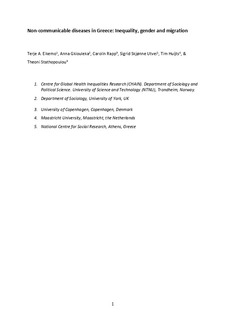| dc.description.abstract | Background: The relationship between gender, migration status and non-communicable diseases (NCDs) is rarely examined. In this study, we rely on data from the MIGHEAL Survey on health inequalities in Greece collected in 2016 comprising 1332 respondents of which 59.98% identified themselves as Greek-born, 24.02% as immigrants from Albania and 15.99% as immigrants from another country than Albania, to analyse this often neglected relationship. With the help of average risk ratios, this paper explores and explains gender inequalities in heart or circulation problems, high blood pressure, breathing problems, allergies, back or neck pain, muscular pain, stomach or digestion-related problems, skin conditions, severe headaches, and diabetes in Greece among Greek-born individuals, Albanian immigrants and among immigrants of ‘other origin’. We found that both among Greek-born and among immigrant groups women report substantially higher rates of NCDs although gender inequalities are more pronounced among ‘other-origin’ immigrants. Further, our findings show that the observed gender inequalities are fostered by occupational factors both among Greek-born and migrants.
Policies targeted at reducing the risk of NCDs need to consider not only gender and migration status but also how their intersection renders certain social groups more vulnerable than others. Moreover, specific attention should be paid to the underlying structural factors associated with NCD reporting, such as working conditions, labour market regulations and employment initiatives that have a differential health influence across diverse population groups. | nb_NO |
